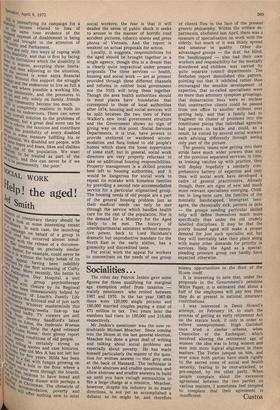141, WORK
! the aged!
jef Smith
trgtaltirtg a i3f conspiracy theory should be trIcidenpA°°k at some interesting recent t! can.;;8; In each case, the launching Ccia] vaign on behalf of a group in need has occurred almost simul4:sv ahrl With the release of a documentks. sh tnuching on precisely similar er het tit e it is for example, could never be qtiog without the lucky break of its eribled1Peal having been indelibly HerY the first screening of Cathy p More recently, the battle to thee,. additt..7 thte;msii.1 b`nn Day Hospital, a unit Vehetr in group psychotherapy N I, h, with closure by its Regional a been • .litellPesie„ immeasurably helped by of Loach's Family Life e4eLs th th thuni, e fictional end of just such N'tY/tarn`Y. Whoever masterminds this teli,sliPperiPa7ignifig/media link-up has 15 '",g oadly. 4retn 7 TV viewers are still 6„ ,deremy Sandford's latest this ocina, the Inebriate Woman "eek Help the Aged released Yk Com et aotisi e -onie,' their glossy report ' rep tlig conditions of old people. Ni4jes, tei7.rt is certainly strong on IN 'Nye „thg quotes and case histories. 1'0%118 Year old Mrs A has not left her f the 44ed c)t. five years. Hilda has been a-nda flat with fungus growing on rii`afy e. a hole in the floor where a rtiA17,sitor went through the boards. -a re k 'rit his ons to have bread and irkt4eoleihori 4.Sunday dinner with perhaps a ,` uhristrnas. The chronicle of fies<, 'lecotranodation, poverty and
a 'Imp
' offer nothing new to most social workers; the fear is that it will deaden the sense of public shock it seeks to arouse in the manner of horrific road accident pictures, tobacco scares and press photos of Vietnam. And the report is weakest on actual proposals for action.
Locally, it suggests, responsibilities for the aged should be brought together in a single agency, though this is a dream that is clearly quite impractical under present proposals. The three services — health, housing and social work — are at present provided through three different channels and reforms in neither local government nor the NHS will bring them together. Though the area health authorities should in most places have boundaries that correspond to those of local authorities after 1974, housing and social services will be split between the two tiers of Peter Walker's new local government structure and the Government shows no sign of giving way on this point. Social Services Departments, it is true, have powers to provide sheltered or wardened accommodation and flats linked to old people's homes which share the loose supervision of some staff, but in general, social work directors are very properly reluctant to take on additional housing responsibilities. Property management is a skilled process best left to housing authorities, and it would be dangerous for social work to repeat its mistake with homeless families by providing a second rate accommodation service for a particular stigmatised group. The housing needs of old people are a part of the general housing problem just as their medical needs can only be met through the service which handles health care for the rest of the population. Nor is the demand for a Ministry for the Aged likely to be met. The history of interdepartmental ministers without executive power, back to Lord Hailsham's dramatic but unproductive mandate for the North East in the early sixties, has a gimmicky and discredited taste.
For social work the appeal for workers to concentrate on the needs of one group of clients flies in the face of the present generic philosophy. Within the wtlfare departments, abolished last April, there was a measure of specialisation on work with the elderly, but much of it was thinly spread and amateur in quality. Other disadvantaged groups — the deaf, the blind, the handicapped — also had their own workers and responsibility for the mentally disordered and children was carried by quite separate council departments. The Seebohm report demolished this pattern, pointing out that it inhibited rather than encouraged the sensible development of expertise, that so-called specialisms were no more than arbitrary symptom groupings, that demarcation lines were so unclear that unattractive clients could be passed from one office to another without ever getting help, and that a family had to fragment its cluster of problems into the constituent pieces that individual agencies had, powers to tackle and could, as a result, be visited by several social workers each advising differently through seeing only part of the picture. The generic teams now getting into their stride have much wider powers than any of the previous separated services; in time, as training catches up with practice, they will deploy hopefully a similarly comprehensive battery of expertise and only then will social work have developed a cadre of general practitioners. Already though, there are signs of new and much more relevant specialisms emerging. Children in long-term care, the families of the mentally handicapped, immigrant teenagers, the chronically sick, parents in debt — the groups needing particular skilled help will define themselves much more specifically than under the old crudely labelled disciplines. It may be that the poorly housed aged will make a proper demand for just such specialist aid, but they will inevitably take their place along with many other demands for priority in services. Help the Aged as a specialpleading pressure group can hardly have expected otherwise.










































 Previous page
Previous page